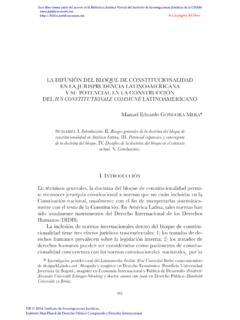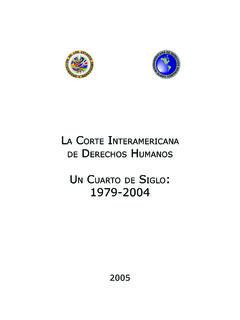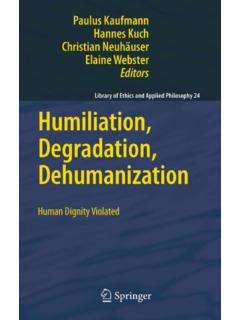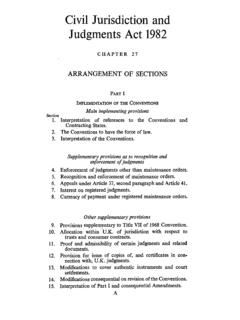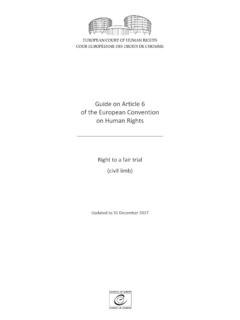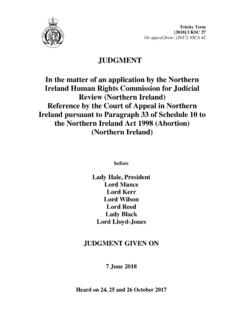Transcription of GRADING SCALE OF DEGRADATION: IDENTIFYING …
1 GRADING SCALE OF degradation : IDENTIFYINGTHE THRESHOLD OF DEGRADING TREATMENT ORPUNISHMENT UNDER ARTICLE 3 ECHRYUTAKAARAI-YOKOI*AbstractAmong international human rights instruments, the rich jurisprudence on Article 3 ofthe European Convention on Human Rights (ECHR) has yielded meaningful andworkable principles for defining the normative parameter of freedom from torture andother forms of maltreatment. While identification of torture has been limited to a smallnumber of straightforward cases of assault giving rise to physical and mental anguishof an especially aggravated character, the overwhelming majority of cases raised underArticle 3 have related to degrading or inhuman treatment or punishment.
2 By focusingupon threshold cases involving freedom from degrading treatment or punishment, theleast serious absolute right under Article 3, this article seeks to delineate the boundariesof the effective guarantee provided by this absolute right in the Strasbourg organsjudicial policy. The examination suggests an encouraging sign that the Strasbourgorgans have funnelled considerable vigour and creativity into their law-making policy,elaborating on the most succinct provision in the ECHR. They have capitalised on thegraduating SCALE of degrading treatment so as to diversify the protective scope of Article3, in a continued search for progressive European public order.
3 They have supplied toindividual victims a horizon of possible arguments, which can unfold along linesconducive to the shaping and restructuring of the emerging European from torture and other forms of ill-treatment is recognised as aright of paramount significance under international human rights international human rights instruments, the rich jurisprudence onArticle 3 of the European Convention on Human Rights has yieldedNetherlands Quarterly of Human Rights, Vol. 21/3, 385-421, 2003.@ Netherlands Institute of Human Rights (SIM), Printed in the *Lecturer in International Law and International Human Rights Law, Kent Law School,University of Kent, United Kingdom, and Deputy Director of Programme, BrusselsSchool of International Studies, Belgium.
4 The author is grateful to Professors Robyn Martinand James Crawford for their helpful comments on earlier , generally, Bank, R., International Efforts to Combat Torture and Inhuman Treatment:Have the New Mechanisms Improved Protection? , 8 EJIL, 1997, p. 613; and Donnelly, J., TheEmerging International Regime Against Torture , 33 Nth. ILR,1986, p. and workable principles for defining the normative parameterof this fundamental 3 prohibits torture, or inhuman ordegrading treatment or punishment in absolute terms. It is not subject toany express limitation by reference to saving clauses. Nor can theprohibition be derogated from, even in time of war or other publicemergency, under Article view of the absolute nature of theprohibition, the rights envisaged in Article 3 constitute one of thefundamental values of the democratic societies making up the Council ofEurope.
5 4with the infringement of these rights viewed as an assault not onlyon the dignity of an individual person but also on the public order ofEurope as a non-derogable character of Article 3 and itsobligationserga omneslend support to the view that prohibition of torture orother forms of ill-treatment constitutes part ofjus cogensin the normativehierarchy of international Article 3 to come into play, there must exist a minimum level ofseverity relative to a particular treatment or condition. The European Courtof Human Rights (the Court) has recognised that there is a three-tierhierarchy of proscribed forms of ill-treatment: torture ( seuil supe rieur ,inhuman treatment or punishment, ( seuil interme diaire ) and degradingtreatment or punishment ( seuil minimum de de clenchement de l article3 ).)
6 7In theGreekCase, the now defunct European Commission of HumanRights (the Commission) confirmed this hierarchy, stating that all torturemust be inhuman and degrading treatment, and inhuman treatment alsoYutaka Arai-Yokoi2As regards Article 3 ECHR, see Addo and Grief, N., Is There a Policy Behind theDecisions and Judgments Relating to Article 3 of the European Convention on HumanRights? , 20 ELR, 1995, p. 178; Does Article 3 of the European Convention on Human RightsEnshrine Absolute Rights? , 9 EJIL, 1998, p. 510; Cassese, A., Prohibition of Torture andInhuman or Degrading Treatment or Punishment in: MacDonald, , Matscher F.
7 , andPetzold, H., (eds.),The European System for the Protection of Human Rights, Dordrecht, MartinusNijhoff, 1993, Ch. 11; van Dijk, P., and van Hoof, ,Theory and Practice of the EuropeanConvention on Human Rights,3rded., The Hague, Kluwer, 1998, Ch. VII, para. 3; Duffy, , Article 3 of the European Convention on Human Rights , 32 ICLQ, 1983, p. 316; and Harris,D. J., O Boyle, M., and Warbrick, C.,Law of the European Convention on Human Rights, London,Butterworths, 1995, Ch. Kingdom, Judgment of 18 January 1978, A 25, para. 163; andRibitschvsAustria,Judgment of 4 December 1995, A 336, para. Kingdom, Judgment of 7 July 1989, A 161, para.
8 TheFirst GreekCase, the Commission observed that a Contracting party, when bringing analleged breach of the Convention before the Commission under Article 24, is not to beregarded as exercising a right of action for the purpose of enforcing its own rights, but ratheras raising an alleged violation of the public order of Europe :Nos. 3321-23 & 3344/67,Decision of 24 January 1968, 1968, 11 Yearbook of the European Convention on Human Rights(hereinafter Ybk) p. 730, at pp. 762-764. See also the applicant States argument inNo. 9940-44/82, France and OthersvsTurkey, where they assailed administrative practice of ill-treatmentproscribed by Article 3: Decision of 6 December 1983, 1983, 26 Ybk Part.
9 Two, p. 1, at p. Human Rights Committee, General Comment 29, CCPR/C/21 , para. , F., Article 3 , in: Pettiti, L-E. , Decaux E. and Imbert, ,La Convention Europe ennedes Droits de l Homme Commentaire article par article, Paris, Economica, 1999, at p. in theTyrerCase, the Court observed that not alldegrading treatment or punishment would amount to the level described both the Court and the Commission (the Strasbourgorgans) have introduced an element of gradation or relativity into what istermed an absolute right , with the threshold of gravity set at the lowest levelfor degrading treatment or punishment. Further, as the Court emphasisedin theSelmouniCase,10the order or hierarchy distinguishing the threecategories of ill-treatment is fluid in nature.
10 According to the Court, theinterpretation recognising the Convention as a living instrument requiresthe minimum standard of severity to be assessed in harmony with societalprogress. This entails two seminal implications. First, acts which wereclassified as inhuman or evendegradingtreatment in the past might berecognised as torture in the , as seen in the prevalence ofabolitionist approach to capital punishment,12the strength of subsequentState practice andopinio jurisamong the member States might be such that itcould help remove even a clear textual barrier13to the teleologicalconstruction and identify inhuman and degrading is,however.



